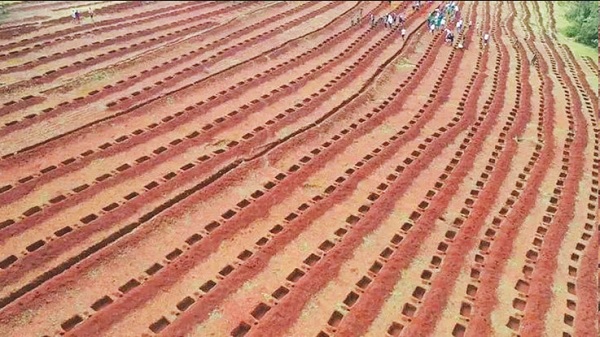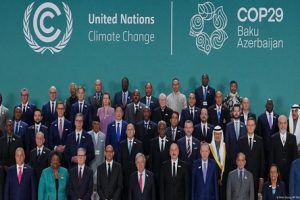
Recognizing the severity of climate change’s impact, Ethiopia has been taking various measures to withstand the growing effects of climate change. Nowadays, Africa, in general, and East African countries are facing natural disasters due to climate change, resulting in the residents of the continent bearing the consequences. Despite the fact that large industries of the western countries are emitting carbons, they are not contributing to the efforts to mitigate climate change.
In recent years, Ethiopia has emerged as a beacon of hope in the global fight against climate change through its ambitious Green Legacy Initiative. Launched in 2019 under the visionary leadership of Prime Minister Abiy Ahmed, this initiative aims to combat environmental degradation and deforestation by planting billions of trees across the country. Ethiopia’s commitment to reforestation not only addresses local environmental challenges but also sets a significant example for the rest of the world in sustainable development and climate action.
Over the past five years, Ethiopia has successfully planted an astonishing 32 billion tree seedlings across the country. This extensive reforestation effort has been instrumental in restoring degraded landscapes, mitigating the impacts of climate change, and preserving the nation’s rich biodiversity. Impressively, 90% of these planted seedlings have effectively grown, demonstrating the initiative’s tangible impact on the environment.
In a display of unprecedented commitment, Ethiopia set a world record last year by planting 566 million tree seedlings in a single day. This extraordinary achievement not only highlighted Ethiopia’s dedication to environmental sustainability but also garnered international attention and support for its reforestation efforts.
The success of the Green Legacy Initiative is rooted in its inclusive and community-driven approach. During the first phase of the initiative, an astounding 20 million people actively participated in tree-planting activities, showcasing widespread grassroots engagement and environmental stewardship. As Ethiopia enters the second phase of the initiative, plans are underway to plant an additional 25 billion tree seedlings, aiming to further expand forest cover and enhance ecosystem resilience.
In 2024, Ethiopia has set a target to plant 7.5 billion tree seedlings, marking another significant step towards achieving its reforestation goals. Looking ahead, the country aims to reach an ambitious milestone of 50 billion planted tree seedlings by the end of the next two years. This forward-looking strategy underscores Ethiopia’s steadfast commitment to environmental conservation and sustainable development, positioning the nation as a global leader in climate action.
Of the seedlings planted in the fifth round of the Green Legacy Initiative of Ethiopia, the growing level has reached 90 percent, according to the Ministry of Agriculture.
Fekadu Berhanu, the Head of the Ecosystem Soil Water Conservation and Communal Agriculture Desk at the Ministry of Natural Resources Development, Protection, and Utilization, told Ethiopia Press Agency that the Ministry has completed the first phase of evaluation on the development of seedlings. Accordingly, the seedlings’ development level has reached 90.4 percent.
Indicating that such evaluations are conducted twice a year, the director added that this year’s development level is significantly higher than in previous years. The level of progress is increasing year by year; in the previous assessment, the seedling development level did not exceed the 80s. The society’s sense of belongingness is a significant reason for the increase.
Serious tasks have been undertaken in the care and treatment of the seedlings, leading to an improvement in their development level.
Ethiopia’s Green Legacy Initiative, a national reforestation program, is preparing to plant more than 6.5 billion tree seedlings this upcoming planting season, according to Adefres Worku, the Coordinator of the Initiative’s Technical Committee.
The program has already mapped 504,000 hectares of land out of the 1.8 million hectares where soil and water conservation efforts have been undertaken to prepare the sites for planting. This massive reforestation effort is part of Ethiopia’s broader strategy to address deforestation and ensure food security.
Data from 2000 to 2013 indicates that the country was losing an average of 92,000 hectares of forest cover annually. However, the Green Legacy Initiative aims to reverse this trend by preventing further degradation and increasing the nation’s forest cover.
Beyond environmental protection, the initiative highlights the multifaceted benefits of the program, such as creating job opportunities in nurseries, as well as in sectors like animal husbandry, beekeeping, poultry farming, and fruit and vegetable production.
The initiative is also expected to bolster Ethiopia’s international standing as a leader in climate change mitigation. Prime Minister Abiy Ahmed’s administration is spearheading the Green Legacy Initiative, building on the lessons learned from previous years.
The program has inspired neighboring countries, and plans are underway to launch the initiative on a weekly and monthly basis with the participation of Ethiopian citizens. Furthermore, the government has submitted a request to the Guinness Book of World Records to recognize the initiative’s ambitious goal of mass tree planting, where millions of Ethiopians are expected to participate.
The Green Legacy Initiative is poised to deliver multifaceted benefits to Ethiopia’s economy, society, diplomacy, and overall efforts to combat the impacts of climate change.
Ethiopia’s Green Legacy Initiative has become a critical demonstration in the efforts to withstand climate change impacts, and many international organizations have witnessed the aforementioned truth. Agnes Kijazi, the World Meteorological Organization (WMO) Director for the Regional Office for Africa (RAF), is one of them.
Kijazi told local media that climate change is a global threat, as African countries are being severely tested. Regarding Ethiopia’s continued efforts in the Green Legacy program, she said that the Green Legacy Initiative is resulting in a remarkable outcome to mitigate the impacts of climate change.
Ethiopia’s Green Legacy development is a clear manifestation of resisting the climate-induced impacts, she said, stressing the need for global collaboration to resolve the problem in a sustainable manner.
“I would like to appreciate and congratulate the government of Ethiopia for this action of planting trees. The more trees you have, the more carbon you will take from the atmosphere.
Ethiopia is doing a very good job in planting these trees, and we encourage other members in Africa to do the same. We have a number of countries that are planting trees, but they can also learn how Ethiopia is doing.”
The Director stated that the World Meteorological Organization (WMO) Regional Office for Africa is supporting countries on the continent to develop a strong early warning system.
“For Africa, what we are doing now as WMO to support members in Africa is to make sure that we have very good early warning services. Having early warning services is a way to adapt for people to know that disaster is coming. So, we are enhancing early warning services as part of adaptation to these challenges of climate change.”
Fetene Teshome, the Director General of the Ethiopian Meteorology Institute (EMI), noted that the Green Legacy program is being carried out with special attention as a developmental framework that enables mitigating the impacts of climate change.
The Green Legacy program is instrumental in preventing climate change and maintaining a sustainable ecosystem as Ethiopia’s forest coverage has recently reached 23.6 percent, according to Ethiopian Forest Development.
As Ethiopia continues to lead by example, the 2024 launch of the Green Legacy Initiative reinforces the country’s role as a global leader in environmental stewardship and underscores the urgency of collective action in addressing climate challenges worldwide.
Apart from ecological benefits, such as improved soil fertility and enhanced water retention, the Green Legacy Initiative has also generated socio-economic opportunities for millions of Ethiopians. Reforestation efforts have created jobs in rural communities, particularly benefiting women and youth, and contributed to poverty reduction and economic growth.
Ethiopia’s Green Legacy Initiative serves as a beacon of hope and inspiration for the world, demonstrating the transformative power of collective action in addressing global environmental challenges. By scaling up tree-planting efforts and fostering partnerships, Ethiopia continues to pave the way towards a greener, more sustainable future for its people and the planet as a whole.
BY GIRMACHEW GASHAW
THE ETHIOPIAN HERALD WEDNESDAY 26 JUNE 2024





